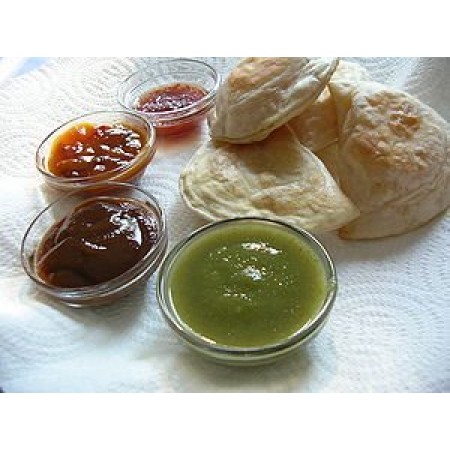Cooking flower sauces

Sauces have long been one of the most popular condiments in modern cooking. As far back as the 17th century, French cooks began to use them for the first time to create treats for the ruling monarchs, and now these ingredients are made up of a variety of elements, including flowers. In this article, we will talk about what are the most common types of sauce, an integral part of which are the petals and buds of a variety of plants.
How plants are used in the manufacture of sauces
The most common sauce prepared by their plants is salsa. For the first time, Indians began to use it in the XVI century - then the colonialists-conquistadors noticed that the indigenous population of then America uses fish and meat dishes with a strange addition. It consists of hot peppers, tomatoes and ground pumpkin seeds.
The following plants can be used to make sauces for flower salads: violets, mallow, rose petals and thin-leaved marigolds. Sauces made from mixtures of spicy plants (rosemary, sage or thyme) with some crushed petals of calendula and nasturtium are very often added to a vegetable or meat dish.
Most Popular Flower Sauces
Clove vinegar is an exotic seasoning that is most often added to a flower or fruit salad. This mixture is prepared from:
- carnations of cloves (ground to a powder state);
- hot vinegar (4 cups).
All this is poured into one container and infused for three weeks in a well-lit place. After that, the resulting solution is decanted and poured into decorative dishes.
Another popular flower sauce is flower salsa, which is made from the following ingredients:
- Canned pineapple;
- Yellow pepper (one piece that is cut into small particles);
- White sweet onion (half a cup);
- Lemon juice (two tablespoons);
- Salvia flowers (third of a cup);
- Powdered hot peppers (added to taste).
All composite ingredients are mixed in one container and placed in the refrigerator for 6 hours. This sauce is best for fried fish dishes.
Of course, the sauces described above are far from suitable for every dish, but if you plan to celebrate the upcoming holiday or just want to please your loved ones with some exotic food, the presence of this seasoning can significantly diversify your table, making even familiar dishes more unique and original.